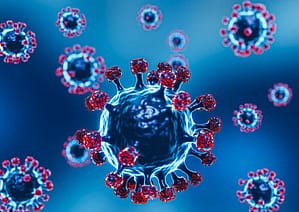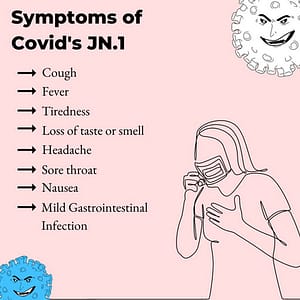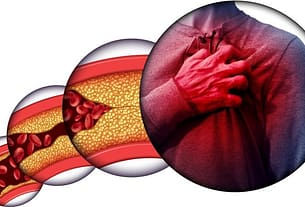A total of 22 cases of Covid-19 subvariant JN.1 have been reported in India till December 21, official sources said on Friday.Sources also stated that there has been no clustering of cases reported so far and all the cases of the JN.1 subvariant have mild symptoms.
On Friday, India reported 640 new Covid-19 cases, bringing the total number of infections to 4.50 crore (4,50,07,212). According to the data of Union Health ministry, number of active cases increased from 2,669 to 2,997. The death toll reached 5,33,328, with one new fatality in Kerala, the data updated at 8 am stated. The number of people who have recovered from the infection stands at 4,44,70,887, contributing to a national recovery rate of 98.81%.

Dr Soumya Swaminathan & WHO against JN.1 Variant of COVID-19
Meanwhile, amid rising concerns over the emergence of the new variant of the coronavirus, former World Health Organisation (WHO) chief scientist Dr Soumya Swaminathan asserted that there is no need to panic currently as it is a variant of interest and not of concern. However, she urged people to be cautious by taking proper precautionary measures.
Speaking to ANI exclusively, Dr Soumya Swaminathan, former DG, of the Indian Council of Medical Research (ICMR) said, “We need to be cautious, but we don’t need to worry because we don’t have any data to suggest that this variant JN.1 is more severe or it’s going to cause more pneumonia, more death.”
“I think what we need to do is try to take the normal preventive measures that we are all now familiar with. We were familiar with Omicron, so it’s the same family. So not much has changed, but 1 or 2 new mutations have come up. And that’s why I think WHO has said let’s keep a watch on it. It’s a variant of interest. It’s not a variant of concern,” said the doctor.
Globally, cases of JN.1 have been reported from the US, some European countries, Singapore and China. Pirola and its descendants accounted for 17% of the sequences uploaded to the global database GISAID by December 2, with more than half the sequences being JN.1, as per a previous statement by WHO Technical Advisory Group on Covid-19 vaccine composition.

10 things you need to know in case of JN.1 Variant of COVID-19
- India has reported 22 cases of the JN.1 sub-variant so far, causing heightened attention and concern. Of 22 cases, 19 were detected in Goa, .
- All 19 cases of the JN.1 sub-variant traced in Goa are confirmed as inactive. The variant was detected during genome sequencing of samples collected from patients.
- State epidemiologist Dr Prashant Suryavanshi told PTI that the patients with the JN.1 variant had mild symptoms and have recovered now.
- Kerala and Maharashtra both have reported one each COVID case of the JN.1 sub-variant.
- Meanwhile, India recorded 640 fresh Covid-19 cases, raising the number of active infections to 2,997.
- The World Health Organization has classified JN.1 as a variant of interest, distinct from its parent lineage BA.2.86, with a low overall risk based on current evidence.
- About 1 in every 24 people in England and Scotland has Covid-19, with London the worst-affected area as the highly infectious JN.1 variant spreads rapidly, according to Bloomberg.
- The prevalence is highest among individuals aged 18 to 44, as indicated by a joint report from the UK Health Security Agency and the Office for National Statistics.
- The report attributes the rising cases to the combination of cold weather, shorter days, and increased socializing during the winter season, creating a conducive environment for respiratory virus transmission.
- Across England and Scotland, the overall Covid prevalence rate is 4.2%, with London being the worst-affected area at 6.1%.CDC says JN.1 variant accounts for 39%-50% of COVID cases in US
Where is it circulating, and how is it effecting the outbreak?
According to data compiled by GISAID, of the total 15,416 positive cases of Covid-19 sampled across 56 countries, 43% (6,682) samples have returned positive for BA.2.86 or its sub-variants including JN.1. At least 35 nations have so far reported to GISAID the presence of the variant. Among them, six regions — Spain, Singapore, Brazil, Belgium, Netherlands and Malaysia — have found the variant in more than 50% of positive samples they have sequenced, data shows. In Spain and Singapore, close to two-thirds of all samples sequenced have come back positive for this variant, data shows.
In the US, CDC projects that JN.1 will continue to increase as a proportion of Sars-CoV-2 genomic sequences. Currently, around a fourth of all positive samples being sequenced in the US are returning positive for JN.1, according to CDC data.
In Singapore, this variant is being attributed for a massive resurgence in Covid-19 cases. Average new infections in the city-state have jumped from 1,532 cases a day two weeks ago, to 8,006 new cases a day for the week ended December 9, according to government data.
India, meanwhile, has also seen a spike in infection numbers in the past few weeks. Lastly 640 new infections were reported across the country till December 21, according to HT’s Covid-19 dashboard. This number was 125 a week ago, and was 59 the week before that. The number of average daily deaths, however, have remained stagnant.
Symptoms and severity in JN.1 Variant of COVID-19

Despite the surge in cases, Singapore has yet to report a death attributed to Covid-19 since at least early November, according to global data compiled by Our World In Data. In the US, meanwhile, the seven-day average of daily deaths from Covid-19 has dropped from 177 for the week ended December 2, to 103 deaths for the week ended December 9 (the latest this data has been released). The numbers in other countries where JN.1 has been reported are similar.
In India, on average 0.9 deaths have been reported every day in the past week — this number was the same the week before that. While reading this figure, what should be kept in mind is India’s massive population, which gives context to how small this number truly is.
Vaccine efficacy in JN.1 Variant of COVID-19
This is where the best news concerning the new variant lies. According to both WHO and CDC, updated vaccines are entirely effective against JN.1. According to WHO, sera from patients who had Omicron breakthrough infections (including XBB), exhibited robust neutralising activity against BA.2.86, suggesting that upcoming XBB.1.5 monovalent vaccines could confer added protection, by triggering the expansion of existing B cells that will enhance cross-protection against BA.2.86 and its descendant lineages (including JN.1). In addition, the existing Covid-19 tests and treatments are also expected to be effective against JN.1.
Are Vaccines Effective Against JN.1 Variant?
Talking about the vaccine’s efficacy against the newly spreading COVID variant JN.1, WHO officials said that the current coronavirus vaccines continue to protect against severe disease and death from JN.1 and other circulating variants of the COVID-19 virus. This means those who are fully vaccinated are at a lower risk of catching this virus and a higher risk of surviving the complications of the virus symptoms.





